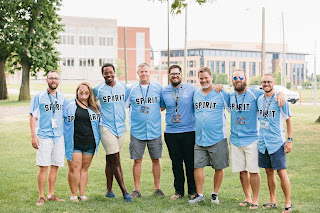They do not care how much you know, until...(Advice for young teachers,and old ones, as well)
(This article originally appeared in a newsletter for the Spirit Summer Music Camps in April of 2009)
They don't care how much you know, until...
I am sure you can finish the phrase. This oft used quote
has been attributed to Teddy Roosevelt, but this phrase is much more profound then
cliché in our profession. When many programs are shrinking, and recruiting and
retention is an on-going concern for music educators, let me suggest a small
idea that may make a big difference. As a good friend, and great band director,
Alfred Watkins once told me, “You cannot teach empty chairs.”
FULL CIRCLE
2014 South Forsyth Middle School Symphonic Band performing at the Southeastern United States Honor Band and Clinic at Troy University.
|
 |
| My first band (Beaumont Middle School) I ever took to Festival, now called Music Performance Assessment in 1989 |
It was early in my career when I had a guest clinician, who
was a local band director of an excellent band program, came to observe me
teach and also work with my concert ensemble. During the rehearsal the students
did a great job and played well. Following the rehearsal, I was excited to sit
down to chat with the clinician, and I hoped to hear numerous compliments.
Instead, I will never forget the first words he said during that meeting, “The
students are playing well, but there is no connection between you and the
members of the band.” He then said, “You are doing a good job of teaching
music, but that is not what you teach.” I am sure I had an amazingly baffled
look on my face as I questioned him, “I thought music was what I taught.” He said,
“No, you teach MUSICIANS, not music.” My teaching career took a radical left
turn at that very moment.
 |
| The officers of the 1998 Haines City High School Emerald Brigade. This was a hard working group of students. |
He went on to elaborate by asking me if I could write a
paragraph on every member of the ensemble on topics, such as; their strengths
and weaknesses as a player, their motivation for playing an instrument, what was
their best academic subject, what their parents do for a living, what type of
grades they receive in their other classes, why they are in band, name five of
their friends in band, etc…I told him probably not. He then said, “You will not
be a great teacher until you can.” He
told me he could do it and I believed him. I have never gotten to 100% with my
students, but very few, if any, students have left my programs when I was able
to accomplish this task. Those that have left, almost without exception, I have
found myself unable to write the paragraph as they quit.
 |
| 2003 Osborne High School Red Regiment, performing, My Spanish Heart. |
I learned from that one meeting that our profession is,
first and foremost, a people business. It is easy to get caught up in preparing
for a concert, chasing wrong notes, sitting in booster meetings, holding
auditions, planning a trip, completing purchase orders, answering emails and
all of the many other day-to-day activities of being a band director and easily
lose sight of the people who are the cornerstone of what we do, OUR STUDENTS.
 |
| 2008 Starr's Mill High School Panther Pride. That was a great group of people. |
Our music schools do a good job of teaching us about music, giving
us great performance experiences, and most provide a good foundation for a
career in education. Almost none of our music schools—and Colleges of
Education, either--provide future teachers with a foundation in the art of
dealing with people. Some people are naturally gifted in this area; the rest of
us, including myself, must continually work at this skill. There are many books
on this topic. John Maxwell’s, Becoming a
Person of Influence, is one of the first books on this topic I read and I
still reread it often. Other suggested books by John Maxwell are Winning with People and 25 Ways to Win with People. These books
would be a good starting point, but you could enter a search at any online
bookstore on this topic and the list is endless.
 |
| 2011 Fayette County High School Marching Tigers at Pearl Harbor, Hawaii. Kayla Poor is in this picture. |
 |
| Fayette County High School Marching Tigers in 2010 at the White House. |
So I ask, can you write a paragraph on every member of your
ensembles? On half of the members in the ensemble? On a handful of the members?
It is never too late to start connecting with and learning your subjects as
well as you know your subject matter. Because,
they do not care how much you know until…




Comments
Post a Comment